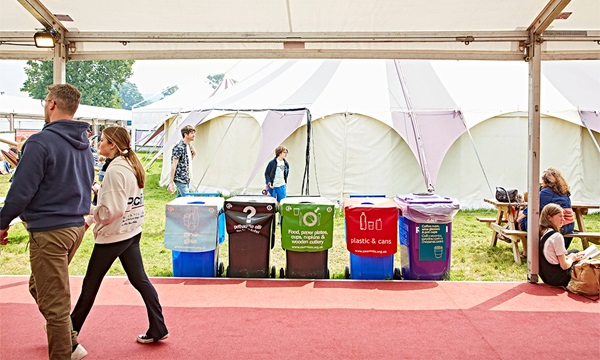Andy Fryers has been at the forefront of the Hay Festival’s sustainability ethos for almost 20 years.
In 2006 he became the festival’s first Sustainability Director, and the subsequent years have seen many initiatives designed to minimise its environmental footprint.
“Our approach has always been threefold: reducing the festival’s direct impact, educating and engaging our audience, and ensuring that sustainability is a key theme in our programming,” said Andy.
The festival has pioneered practices such as using reusable cups and bar glasses, installing water refill stations, and minimising single-use plastics, leading to a reduction in coffee cup waste by 99% and cutting plastic and can waste by 75%.
This commitment to sustainability aligns with wider legislative moves in Wales, which Andy welcomes.
“The Wellbeing of Future Generations Act was groundbreaking and is still leading the way,” Andy noted. “It gives us a framework that many other countries lack, but there’s still a lot of work to do in terms of fully implementing it.”
In April 2024, Wales introduced the Workplace Recycling Law which requires businesses to separate their waste for recycling. For the Hay Festival, this was a natural extension of what it was already doing.

“We’ve been ahead of the game for years in terms of waste management,” said Andy. “When the new recycling law came into effect, we were the first business in Wales to be inspected. We passed our inspection with flying colours because we were already doing it. We’ve been doing it for years.”
While he acknowledges that Welsh legislation is ahead of many other regions, Andy argues that businesses should be pushed further to protect the planet.
“I think we need increased smart and targeted legislation,” he said. “At the moment the bar is set too low. There isn’t enough of a of a focus – basically it comes down to those people who know that it’s the right thing to do. Legislation is catching up, but it’s still got a long way to go.
“Legislation should be about trying to drive change in a way which enables businesses and society in general to have a sustainable future. Clearly there are costs involved with complying with legislation. But the cost of doing nothing is that ultimately there is no business on a dead planet.
“If you look at where we are and where we need to be when it comes to net zero there will have to be more legislation coming down the line.”

Thanks to its global footprint the Hay Festival is able to take its sustainability best practice far outside Wales. Through its various international festivals and forums, the festival team has introduced sustainable practices to audiences across the world.
One striking example is in the Maldives, where the Hay Festival ran the first public recycling scheme in 2010.
“There were no public recycling schemes in the Maldives,” Andy explained. “By working with the local Maldives Climate Youth Network, we implemented it during the festival, we showed that it could be done and that this could be adopted outside of just our event.”
Andy believes that the success of the Hay Festival in making such great strides in sustainability, both on home soil and in its work around the world, is due to a combination of Welsh legislation, evolving expectations from audiences and artists, and a willingness on the part of the charity to take positive action.
“There are things we are doing within Wales which are groundbreaking and which demonstrate what’s feasible,” he said. “If we can do it in a small nation like Wales, then of course it can be done in other nations around the world.”
